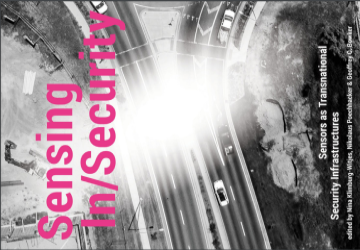CfP Edited Volume: Sensing Security
Based on the experiences of the workshop Sensor Publics, organized by Laurrie Waller and Nina Witjes, there now will be an edited volume tackling questions of sensors, infrastructures and security, of which I have the honour to be a co-editor. We are hoping to get many of your great ideas/insights for this upcoming book. See the full call below.
Call for Contributions
Sensing Security:
Sensors and the Making of Transnational Security Infrastructures
Editors:
Nina Witjes, (MCTS, Technical University of Munich)
Nikolaus Pöchhacker (MCTS,Technical University of Munich)
Geoffrey C. Bowker (Evoke Lab, University of California, Irvine)
In outer-space, underwater, in cities, our homes, or on our bodies – there is no shortage of settings that we now find equipped, imagined and measured with sensors. Anything and anyone can become a sensor, gathering and transmitting data about our world in which “there are now more automated sensors perceiving our environment and the elements that constitute it than there are living human beings” (Tironi, 2017, p. 2). Invested with ideals ranging from ‘invisible computing’, the ‘Internet of Things’, ‘global transparency’ or ‘algorithmic governance’, sensing technologies have been in particular foregrounded in contemporary academic and policy debates about the relations between data, security and politics. Approaching sensors as socio-technical devices (Amichelle et al., 2012) we invite work that explores how they move into and out of the security sector over time that even co-produce novel security regimes (Witjes & Olbrich, 2017; Salter, 2008).
The increasingly globalized socio-technical infrastructures in the making are often understood as creating an environment where the abundance of available data collections increasingly leads to the formation of regimes of ‘dataveillance’ (Amoore & de Goede, 2005). So far, much work on the role of sensors as security devices has mainly attended to their materialities and governance in national settings, providing valuable insights how sensors are shaping knowledge, policies, power relations (Suchman, Follis, & Weber, 2017). Building on and inviting work from a variety of fields, in particular STS, security studies, critical data studies, sociology and anthropology, this edited volume seeks to understand the role of sensors in the making of transnational security infrastructures. We are in particular interested in accounts that contribute to understand how sensing devices – from satellites and drones to environmental sensor networks and digital sensing infrastructures – become invested with global and socio-political significance. We seek both large-scale empirical accounts of historical and contemporary cases across the globe, and welcome papers that critically investigate sensors and sensory networks as situated practices of constructing security, shaping and shaped by changing local and global socio-technical environments.
More specifically, we ask how collective actors, such as states or international institutions, are not only informed by these sensors, but co-constituted in heterogeneous networks (Passoth & Rowland, 2015). Contributing to the emerging intersections between STS and security studies, this volume will attend to questions of macro level security politics and micro level sensing practices as being enabled and mediated through boundary infrastructures (Bowker & Star, 2000). Expanding on Jennifer Gabry´s (2016) work on distributed sensor technologies as shifting the relations, entities, occasions, and interpretive registers of sensing, we argue the interplay of sensing and (algorithmic) sense-making marks an highly important, yet underexplored momentum in the social construction of security in digital societies. Sensory devices are thus not only co-producing multiple ontologies of the world (Jasanoff, 2004) but also mediate “macro-level” entities through information infrastructures in the making and vice versa (Mukerji, 2011; Pelizza, 2016).
Going beyond established boundaries in academic publishing and following the tradition of STS as an engaged program (Sismondo, 2008), we also aim to establish an opportunity to bring together people who work on common topics, but seldomly cross paths due to their differing approaches. Therefore we are keen to invite cooperative chapters from practitioners/activists and social scientists who creatively discuss their work and experiences concerning the various interplays between techno-societies and (in)securities.
The following questions shall guide the contributors:
- Which ‘infrastructural inversions’ (Bowker & Star, 2000) occur when sensors become objects of international political controversy? How do sensors as security devices move in and out security discourses?
- How do sensors embedded in smart borders or body scanners contribute to determine mobilities by co-constructing identities as well as novel forms of (criminological) knowledge through predictive analytics?
- How do sensing practices and data infrastructures play out in different parts of the world? What are the various ways in which our electronic devices – and their leftovers – are connected to human rights violations, conflict and exclusion and how could a responsible governance of sensors look like?
- How do sensors shape, shift and constitute domains of national and international security and policy-making? What is the role of sensor infrastructures in the constitution and mediation between state and non-state actors?
Deadline for abstracts (max. 250 words): 1 March, 2018, notification of acceptance will be given by 15 March, 2018.
We have an initial expression of interest from Mattering Press (https://www.matteringpress.org) for this edited volume and will circulate updates regarding the publishing process as soon as possible.
If you are interested in submitting a chapter we suggest to also consider our related panel at the EASST conference 2018 which can be found here: https://nomadit.co.uk/easst/easst2018/conferencesuite.php/panels/6250
Contact: sensingsecurity@mcts.tum.de
References
Amicelle, A., Aradau, C., & Jeandesboz, J. (2015). Questioning security devices: Performativity, resistance, politics. Security Dialogue, 46(4), 293–306.
Amoore, L., & Goede, M. D. (2005). Governance, risk and dataveillance in the war on terror. Crime, Law and Social Change, 43(2–3), 149–173.
Bowker, G. C., & Star, S. L. (2000). Sorting things out: classification and its consequences. Cambridge, Mass.: MIT Press.
Gabrys, J. (2016). Program Earth: Environmental Sensing Technology and the Making of a Computational Planet. Minneapolis: University of Minnesota Press.
Jasanoff, S. (Ed.). (2004). States of Knowledge: The co-production of science and social order. Abingdon, UK: Taylor & Francis.
Mukerji, C. (2011). Jurisdiction, inscription, and state formation: administrative modernism and knowledge regimes. Theory and Society, 40(3), 223–245.
Passoth, J.-H., & Rowland, N. (2015). Acting in International Relations? The State Hypothesis, ANT, and Agency. In D. Jacobi & A. Freyberg-Inan (Eds.), Human Nature, Agency and Beyond. Reflecting on the Human Element in World Politics (pp. 286–304). Cambridge, MA: Cambridge University Press
Pelizza, A. (2016). Developing the Vectorial Glance: Infrastructural Inversion for the New Agenda on Government Information Systems. Science, Technology, & Human Values, 41(2), 298–321.
Salter, M. B. (Ed.). (2008). Politics at the Airport. Minneapolis: University of Minnesota Press.
Sismondo, S. (2008). Science and technology studies and an engaged program. In E. Hackett, O. Amsterdamska, M. Lynch, & J. Wajcman (Eds.), The handbook of science and technology studies (pp. 13–30). Cambridge, MA: MIT Press.
Suchman, L., Follis, K., & Weber, J. (2017). Tracking and Targeting: Sociotechnologies of (In)security. Science, Technology, & Human Values, 42(6), 983–1002.
Tironi, M. (2017). Regimes of Perceptibility and Cosmopolitical Sensing: The Earth and the Ontological Politics of Sensor Technologies. Science as Culture, 1–7.
Witjes, N., & Olbrich, P. (2017). A fragile transparency: satellite imagery analysis, non-state actors, and visual representations of security. Science and Public Policy, 44(4), 524–534.
Zureik, E., & Hindle, K. (2004). Governance, Security and Technology: the Case of Biometrics. Studies in Political Economy, 73(1), 113–137.






